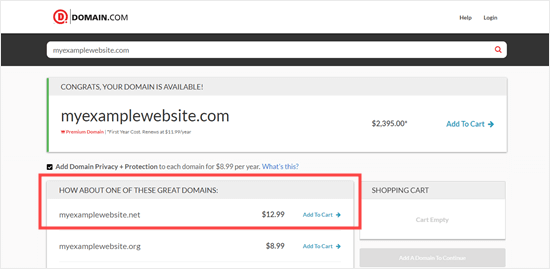You may be wondering what the difference is between.com and.net domain names.
It’s important to pick the right domain name because it can affect your search rankings and business.
I’ll talk about the difference between Com vs Net name extensions and with my experience I will help you decide which one is best for your website.
What Are .Com and .Net Domain Name Extensions?
A domain name serves as the unique address for your website on the internet, such as anukulsaini.com.
Each domain name comes with a TLD, or Top Level Domain, which is essentially its extension. TLDs include familiar options like .com, .net, and .org, among others.
While there is a plethora of domain extensions available, many lack usage restrictions. In recent years, a variety of new extensions like .photography, .design or .coffee have emerged.
Despite this diversity, it’s important to recognise that these extensions originally had specific purposes, and some still carry distinct connotations.
When selecting a domain extension for your website, consider its alignment with your business and its potential to contribute to the establishment of a recognizable brand within your industry.
Now, let’s delve into a comparison between two of the most popular domain extensions: .com and .net.
These extensions, while versatile, have historical associations that might influence your decision.
Understanding the nuances between them can assist you in making an informed choice that aligns with your business goals.
What Is the Difference Between .Com vs .Net Domain Names?

When it comes to domain name extensions, .com and .net stand out as two of the most widely recognized options. If your desired .com domain isn’t available, you might consider using .net, but it’s crucial to understand the distinctions between the two.
The ‘com’ in the .com extension signifies a ‘commercial’ site, making it suitable for a broad range of purposes, including business websites aiming to generate online revenue, personal blogs, portfolios, and more.
Conversely, the ‘net’ in the .net extension denotes ‘network’ and was originally crafted for internet, networking, and email service providers. While .net can be versatile, it may not be the optimal choice for businesses seeking a commercial online presence.
It’s worth noting that the choice between .com and .net can impact how users perceive your website.
The .com extension is often associated with a broader commercial appeal, while .net may be perceived as more specialised in networking services.
In addition to .com and .net, there are other domain extensions like .org, which signifies ‘organization’ and was initially intended for use by nonprofit organizations.
When selecting a domain extension, consider the nature of your website and the image you want to convey, as this choice plays a role in shaping your online identity and brand recognition.
When Should You Choose a .Com Domain Name?

Choosing a .com domain name is often a strategic decision that can significantly impact the success and memorability of your website.
The .com extension has maintained its prominence since the ‘dot-com bubble’ of the late 1990s and continues to be the most popular choice, with over 40% of all registered domain names bearing this extension.
Opting for a .com domain offers several advantages. Firstly, it is widely recognized and associated with the internet, instilling a sense of familiarity and professionalism.
The prevalence of .com in the online landscape makes it easier for people to remember your website address.
Additionally, most mobile keyboards feature a dedicated .com button, simplifying the process for users.
Despite the popularity of .com domains, finding an available and suitable name can be challenging due to high demand.
To overcome this, consider the following strategies:
- Ensure Relevance: Choose a domain name that clearly represents your business and its offerings. For instance, a domain like stargardeningservices.com is more descriptive than starservices.com, and this descriptive way also help you in SEO.
- Add a Modifier: If your preferred domain name is already taken, consider adding a word before or after it to make it unique. Incorporating your location, such as stargardeninghouston.com, can be a smart approach.
- Simplicity is Key: Select a domain name that is easy to pronounce and remember. Avoid using hyphens or numbers, as these can create confusion.
- Utilize Online Tools: Take advantage of online domain name generators. These tools can help generate creative and unique domain name ideas that are still available.
When You Should Use the .Net Domain Extension?

While the .net domain extension is not as popular as .com, there are specific scenarios where it remains a suitable and meaningful choice.
Consider using the .net extension if your website is centered around internet-related services, networking, database hosting, email hosting, or similar offerings.
In some cases, it can also be a fitting option if it aligns well with your brand identity.
For instance, Behance.net is a notable example of a popular online design community utilizing the .net domain extension.
In this case, the choice of .net complements their goal of establishing a network of artists, designers, and companies seeking talent. If your brand positioning emphasises connectivity or networking, .net may be a relevant and distinctive choice.
It’s important to note that while .net represents less than 4% of all registered domain names, its lower prevalence can contribute to a unique and memorable online identity.
If your preferred .com domain is unavailable, and your business aligns with the characteristics associated with .net, it can be a pragmatic alternative.
Ultimately, the decision to use a .net domain should be based on the nature of your services and how well the extension resonates with your brand messaging and identity.
Why You Might Be Tempted to Use the .Net Extension?

The allure of using the .net extension often arises when attempting to secure a domain name, especially when the preferred .com option is unavailable.
Domain name registrars frequently present .net as the primary alternative to .com, creating the impression that it is a widely utilized choice.
However, it’s crucial to recognize that despite this presentation, many well-known internet and network service companies predominantly opt for a .com domain name for their businesses.
The association of .com with commercial enterprises and the internet’s mainstream usage has solidified its status as the default and most recognisable option.
While 4% may seem like a substantial portion, accounting for over 13 million domain names, it’s important to understand that not all registered .net domains are actively in use.
Some businesses acquire a .net extension as a preventive measure to ensure others cannot take it, without necessarily utilising the .net domain for their primary website.
In these cases, the .net domain may either remain dormant or redirect to their primary .com site.
Additionally, some companies initially adopt a .net extension because the desired .com domain is unavailable.
Over time, as resources permit, they often transition to a .com domain while retaining the .net registration for technical and legal reasons.
In essence, while the .net extension can be a fallback option, especially when securing a specific name is a priority, it’s essential to consider the broader implications for brand recognition and online presence, as .com continues to be the gold standard in the digital landscape.
Is .Com vs .Net Better for SEO?

When it comes to choosing between .com and .net for SEO purposes, the good news is that search engines treat both domain extensions equally. There is no inherent advantage in terms of ranking for one over the other.
From an SEO perspective, your primary focus should be on implementing best practices, including creating high-quality, relevant, and targeted content.
The content you provide on your website, along with other SEO factors like backlinks, site speed, and mobile-friendliness, plays a more significant role in determining your search engine rankings than the specific domain extension.
The crux of the matter lies in the choice of your domain name itself, rather than its extension. A domain name that incorporates relevant keywords, such as stargardeningservices.com, can have a positive impact on your SEO.
In this example, the inclusion of the keyword “gardening services” enhances the domain’s relevance to search queries related to that topic, potentially leading to better rankings.
In summary, when deciding between .com and .net, prioritise a domain name that aligns with your content and incorporates keywords relevant to your business or services.
This approach, coupled with adherence to SEO best practices, will contribute more to your search engine rankings than the specific domain extension you choose.
How to Buy a Domain Name
Buying a domain name involves a series of steps to ensure you secure the right web address for your website.
Here’s a comprehensive guide on how to buy a domain name:
- Choose a Reliable Domain Registrar:
- Select a reputable domain registrar to purchase your domain. Popular registrars include GoDaddy, Namecheap and Bluehost. Each registrar offers different features and pricing, so compare them to find the one that suits your needs.
- Check Domain Availability:
- Use the domain registrar’s search tool to check if your desired domain name is available. If your first choice is taken, you may need to get creative or consider variations.
- Select a Domain Extension:
- Decide on the domain extension (e.g., .com, .net, .org). While .com is the most common and recognizable, there are various options available. Choose an extension that aligns with your website’s purpose.
- Add to Cart and Register:
- Once you find an available domain, add it to your cart and proceed to the registration process. You’ll need to provide your contact information and choose a registration duration (usually in yearly increments).
- Privacy Protection (Optional):
- Consider opting for privacy protection (also known as WHOIS privacy) to keep your personal information private. This service prevents your contact details from being publicly visible in the WHOIS database.
- Configure DNS Settings:
- DNS (Domain Name System) settings determine where your domain points on the internet. You can typically use the default settings provided by your registrar or customize them if you have specific hosting requirements.
- Review and Confirm:
- Carefully review your order before confirming the purchase. Check the spelling of your domain, the selected extension, and any additional services you’ve opted for.
- Complete the Purchase:
- Enter your payment details to complete the purchase. Once the payment is processed, you’ll receive a confirmation email with details about your domain registration.
- Verify Ownership:
- Some registrars may require you to verify ownership by clicking a link in a confirmation email. Follow the instructions provided to complete this step.
Congratulations, you’ve successfully bought a domain name! Keep track of your domain registration’s expiration date and renew it in a timely manner to avoid losing ownership.
Additionally, explore additional services offered by your registrar, such as email hosting or website security, to enhance your online presence.



